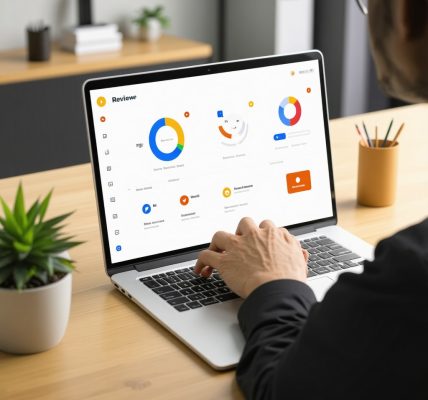My Journey into Managing GMB Citations for Local SEO Success
When I first started optimizing my local business’s presence on Google, I underestimated the power of managing Google My Business (GMB) citations. I thought just claiming the listing was enough. But soon enough, I realized that consistent and strategic citation management played a crucial role in enhancing local search authority and driving traffic.
Over time, I learned that citations — mentions of your business name, address, and phone number (NAP) on other websites — act as powerful signals to Google. They help establish trustworthiness and relevance in local search results. But it wasn’t just about quantity; it was about accuracy and consistency, which I discovered through trial and error.
Why Consistency in Your GMB Citations Made All the Difference for Me
One of the biggest lessons I learned is that inconsistency in citations can confuse search engines and harm rankings. Early on, I found multiple listings with slight variations in my business name or address across various directories. Fixing these discrepancies by standardizing my NAP information across trusted local citation sources quickly improved my local SEO signals.
I carefully audited my citations and used tools recommended by experts to track and update them. For instance, BrightLocal has been invaluable in monitoring citation accuracy and spotting duplicate listings. This hands-on approach helped me build a strong foundation of trust with Google.
How Do I Choose the Right Citation Sources for My Local Business?
Choosing where to build citations is just as important as managing existing ones. I focus on authoritative, relevant local directories and niche-specific sites. For example, if you run a restaurant, citations on Yelp and TripAdvisor carry weight. For general local businesses, directories like Yelp, Yellow Pages, and industry-specific associations are key. I also prioritize sites with high domain authority and those that Google trusts, which aligns with advice shared by Moz’s Local SEO guide.
What’s interesting is that I also integrated citation management with my GMB profile optimization to maximize impact. This included ensuring NAP consistency between my GMB listing and citation sources as well as leveraging backlinks from citation sites to enhance my local ranking signals.
Practical Tips That Helped Me Master GMB Citation Management
Here’s what has worked best for me when managing GMB citations to enhance local search authority:
- Audit Existing Citations Regularly: I set quarterly reminders to check for accuracy and remove duplicates.
- Use Tools Wisely: BrightLocal and Whitespark made citation tracking manageable and efficient.
- Focus on Quality Over Quantity: Adding citations on reputable, relevant platforms mattered more than sheer numbers.
- Maintain NAP Consistency: This was non-negotiable for boosting local SEO trustworthiness.
- Integrate Citations with GMB Optimization: I paired citation work with enhancing my Google Business Profile based on strategies shared in this comprehensive guide.
If you’re managing your own local SEO, I highly encourage you to share your experiences or ask questions about citation management below. It’s a nuanced area but mastering it can truly elevate your local search presence.
For anyone wanting to dive deeper, exploring expert citation services can also be a smart move — they handle the heavy lifting and ensure your citations are optimized for maximum local search impact, like outlined at Expert GMB Citation Services.
Leveraging Structured and Unstructured Citations for Maximum Impact
While structured citations—those appearing on established directories with specific business fields—are fundamental, unstructured citations also play a pivotal role in enhancing local SEO. Unstructured citations include mentions of your business name and contact details on blogs, news articles, social media posts, or even event listings. These often go unnoticed but can significantly contribute to your local search authority when consistent.
I discovered that balancing both types is crucial. Structured citations provide clear, standardized data Google uses for verification, while unstructured citations add contextual relevance and natural backlinks. For instance, getting featured in a local news article or community blog not only builds citations but also enhances your brand’s trustworthiness.
To manage this effectively, I integrated citation tracking tools with manual outreach to local publishers and community sites, ensuring mentions were accurate and linked properly to my GMB profile.
Advanced Citation Cleanup: Going Beyond Basic NAP Consistency
One challenge I encountered was not just fixing NAP inconsistencies but also dealing with outdated or incorrect business categories and descriptions across citation sources. Google increasingly factors in category relevance and business description keywords when ranking local businesses. I made it a point to audit these elements regularly and update them to reflect my current offerings and SEO keyword strategy.
Additionally, I addressed duplicate listings that sometimes had conflicting reviews or old hours of operation. Removing or merging these duplicates helped consolidate my reputation signals and improved my local search rankings.
For a comprehensive approach, I recommend following detailed audits similar to those described in the GMB SEO audit guide. This ensures all citation data aligns perfectly with your Google Business Profile.
How Can Integrating Citation Management with Content Updates Amplify Your Local SEO?
One insightful strategy I explored was combining citation management with regular Google My Business content updates. Google favors active profiles that engage users with fresh posts, offers, or event announcements. When these content updates include consistent NAP and relevant keywords, they reinforce the signals sent by your citations.
Moreover, linking GMB posts back to citation sources or your website can create a cohesive ecosystem of local SEO signals. This synergy not only boosts your rankings but also enhances user trust and engagement.
Industry experts at Search Engine Journal highlight that combining citation accuracy with dynamic content updates is a potent method to dominate local search results (Search Engine Journal Local SEO Guide).
If you’ve had success with integrating citation management and GMB content strategies or have questions about implementation, please share your experience or ask away in the comments below. Engaging in this discussion can deepen understanding and uncover new tactics.
For those ready to take citation management to the next level, exploring specialized tools and expert services can save time and maximize local SEO gains. I recommend checking out advanced options such as expert GMB citation services that provide tailored solutions for citation building and monitoring.
When Citation Management Meets Evolving Local SEO Algorithms
One of the more subtle challenges I’ve encountered in managing GMB citations is adapting to the constantly evolving local SEO algorithms that Google employs. What worked a year ago sometimes needs recalibration today. For instance, Google’s increasing emphasis on behavioral signals and user engagement means that citation accuracy alone isn’t enough anymore. Citation management must now harmonize with user-centric strategies like review generation and localized content updates to maintain an edge.
This dynamic landscape encouraged me to deepen my understanding of how citations interact with other ranking factors. I realized that citations are foundational signals, but without active engagement on your Google Business Profile, their impact plateaus. This insight pushed me to integrate citation efforts more tightly with consistent GMB content updates and review strategies, creating a more holistic local SEO approach.
Is There a Risk of Over-Optimizing Citations? How Do I Strike the Right Balance?
As my experience matured, I questioned whether aggressively building citations could backfire. Over-optimization—such as creating citations on low-quality or irrelevant directories—can dilute authority or even trigger penalties. I learned the importance of discernment, focusing on authoritative, niche-relevant platforms rather than chasing sheer volume.
Expert SEO voices like those at Moz’s Local SEO guide emphasize that citation consistency matters more than quantity. This reassured me that quality citations, paired with natural, unforced link building and user engagement, yield the best results. This balance prevents appearing spammy and aligns with Google’s evolving quality guidelines.
So, my strategy now carefully vets every new citation source, assessing its domain authority, relevance, and even the user experience it offers. This selective approach ensures my local SEO foundation remains strong without risking penalties or wasted effort.
How Integrating Citation Management with Broader Local SEO Tactics Changed My Perspective
Beyond citations alone, I found it invaluable to see them as part of a wider ecosystem involving Google Business Profile optimization, review management, and even on-site SEO. This integration has been a game-changer for my local rankings.
For example, I started cross-linking from citations to my website’s location pages, enhancing backlink diversity and driving referral traffic. Additionally, I aligned citation business descriptions and categories with my website’s keyword strategy, which I refined using tools detailed in comprehensive local SEO optimization techniques. This synergy amplified my overall local search presence and user engagement metrics.
Moreover, managing citations in tandem with regular GMB posts and customer review responses created a virtuous cycle of trust and relevance signals. It’s been fascinating to witness how these elements feed into one another, reinforcing my business’s local authority.
I’d love to hear if you’ve also integrated citation management with broader local SEO tactics—your experiences or any unique challenges you’ve faced could offer fresh insights. Feel free to share or ask questions below; these conversations help us all sharpen our strategies.
For those interested in pushing their citation strategies further, exploring expert services can be worthwhile. Tailored solutions not only handle citation building and cleanup but can also align these efforts with your overall local SEO roadmap, as highlighted in expert GMB citation services.
Embracing Semantic Richness in Citation Data to Enhance Local Search Relevance
As my experience deepened, I recognized that beyond the traditional NAP consistency, enriching citation data with semantically relevant attributes significantly bolsters local search relevance. Incorporating business hours, payment methods, service areas, and even subtle details like accessibility options within citations creates a more nuanced and trustworthy profile for Google’s algorithms. This meticulous attention to semantic completeness not only feeds Google’s Knowledge Graph with richer context but also aligns with evolving local SEO best practices.
One key insight was leveraging schema markup on my website and ensuring that citation data across various platforms echoed this structured information. This harmonization helps Google validate data authenticity across multiple signals, reinforcing my local authority in a competitive landscape. For those looking to refine this approach, diving into comprehensive local SEO optimization techniques can offer detailed guidance.
Adaptive Citation Strategies: Navigating Algorithm Shifts and Behavioral Signals
Google’s local search algorithms have increasingly incorporated behavioral signals such as click-through rates, user engagement, and review sentiment analysis. Recognizing this, I adapted my citation management to be more dynamic, integrating with customer interaction strategies to generate positive engagement that complements citation accuracy. This holistic approach ensures my business remains resilient amidst algorithm fluctuations.
For instance, I began monitoring how citation sources influenced not just rankings but also user perceptions, adjusting my outreach to prioritize platforms fostering authentic customer interactions. This shift towards a user-centric citation ecosystem aligns with insights shared by industry authorities like Search Engine Land, who emphasize the synergy between citation management and behavioral metrics (Search Engine Land: Advanced Local SEO Citation Strategies).
How Do I Maintain Citation Integrity While Scaling Local SEO Efforts Across Multiple Locations?
Scaling local SEO for businesses with multiple locations introduces complex citation integrity challenges. I discovered that a centralized citation management system is indispensable to maintain consistent NAP and category data across each location. Using advanced tools capable of location-specific audits and bulk updates prevents discrepancies that could erode local rankings.
Moreover, adopting a templated yet customizable approach for citation creation ensures each location’s unique attributes are accurately represented without sacrificing efficiency. Cross-referencing these citations with tailored GMB profiles further strengthens local search presence. For those managing multi-location SEO, understanding these nuances is crucial and well-documented in expert resources.
Invitation to Share and Elevate Your Citation Mastery Journey
My journey into sophisticated GMB citation management has been a blend of continuous learning, adaptation, and strategic experimentation. If you’re navigating similar complexities or pioneering advanced citation tactics, I invite you to share your experiences or pose questions about multi-location citation management, semantic data enrichment, or algorithm adaptation strategies. Engaging in this discourse enriches our collective expertise and uncovers nuanced tactics that transcend basic citation practices.
For readers eager to elevate their citation strategies or explore expert solutions that integrate seamlessly with broader local SEO frameworks, consider reaching out through this direct contact page. Tailored guidance can transform citation efforts from a tedious task into a powerful growth lever, amplifying your Google Business Profile’s impact in local search.
Things I Wish I Knew Earlier (or You Might Find Surprising)
The Hidden Power of Unstructured Citations
When I first focused only on structured citations from big directories, I missed out on the subtle impact of unstructured citations—mentions on blogs, event pages, or local news sites. These natural, context-rich mentions not only helped diversify my citation profile but also added trust signals that search engines seem to appreciate more than I expected.
NAP Consistency Is Non-Negotiable, But There’s More to It
I used to believe that simply having consistent Name, Address, and Phone number was enough. Over time, I realized that keeping business categories, descriptions, and even hours updated across citations is equally vital. These details help Google understand what your business truly offers and keep your profile credible.
Quality Over Quantity: A Lesson Learned the Hard Way
Early on, I chased volume—adding my business to as many directories as possible. It backfired. Low-quality or irrelevant citations diluted my authority and sometimes confused Google. Focusing on high-authority, niche-relevant platforms made a noticeable difference in rankings and brand perception.
Integrating Citations with GMB Content Updates Amplifies Results
It surprised me how much more effective citation management became when paired with regular Google Business Profile posts and updates. These dynamic content pieces reinforce citation signals and keep my profile lively, which seems to resonate well with Google’s local algorithm.
The Importance of Semantic Richness in Citation Data
Beyond basic details, enriching citation listings with business hours, payment options, and accessibility features helped paint a fuller picture of my business. This semantic depth not only improved my local search relevance but also enhanced user trust when they found consistent, detailed info everywhere.
Resources I’ve Come to Trust Over Time
Moz’s Local SEO Guide: Their clear explanations on citation consistency and quality helped me prioritize the right directories and avoid pitfalls. It’s like having a local SEO mentor in your corner.
BrightLocal: A go-to tool for monitoring citation accuracy and spotting duplicates. It made the tedious process manageable and gave me actionable insights.
Search Engine Journal’s Local SEO Guide: Their articles on integrating citations with GMB content updates broadened my strategy and helped me understand the bigger picture.
RankingSEO GMB Citation Services: For those times when I needed expert help, their tailored services ensured my citations were not just present but optimized for maximum impact.
Search Engine Land’s Advanced Local SEO Strategies: Their insights on behavioral signals and citation interplay encouraged me to adapt and evolve my tactics with the changing algorithm landscape.
Parting Thoughts from My Perspective
Mastering Google My Business citation management isn’t just about ticking boxes for NAP consistency; it’s a nuanced journey that blends accuracy, quality, semantic detail, and engagement. Through my experience, I’ve learned that integrating citation efforts with ongoing GMB content updates and review management creates a powerful synergy that truly elevates local search authority.
If you’re on this path, remember that quality and consistency will always outshine shortcuts. And while tools and expert services can lighten the load, nothing replaces hands-on attention and adaptation to your unique market.
If this resonated with you, I’d love to hear your thoughts or experiences with citation management. Feel free to drop your own stories or questions below — sharing what works (and what doesn’t) helps us all grow stronger in local SEO.


